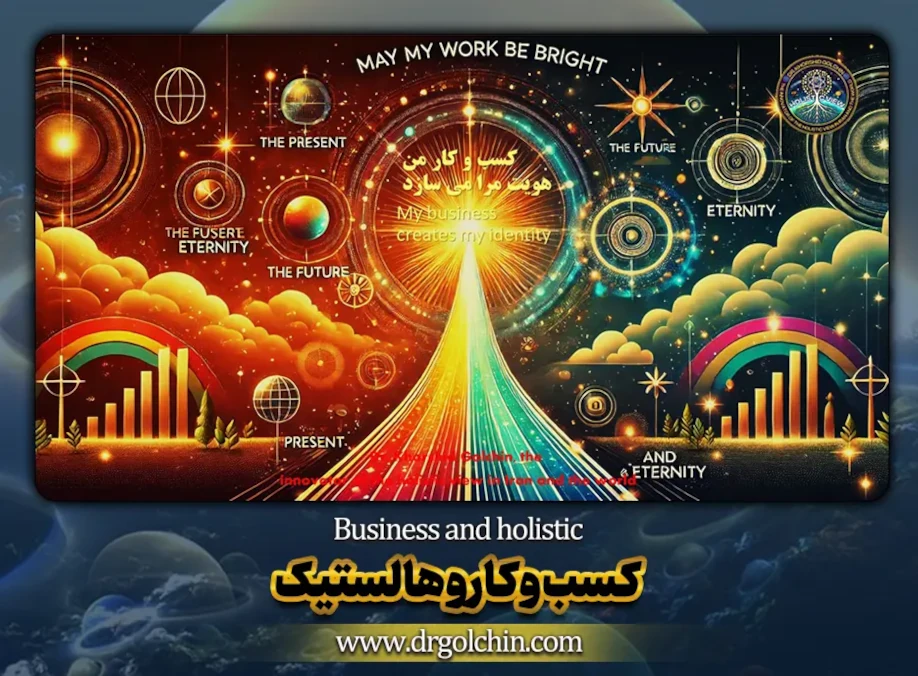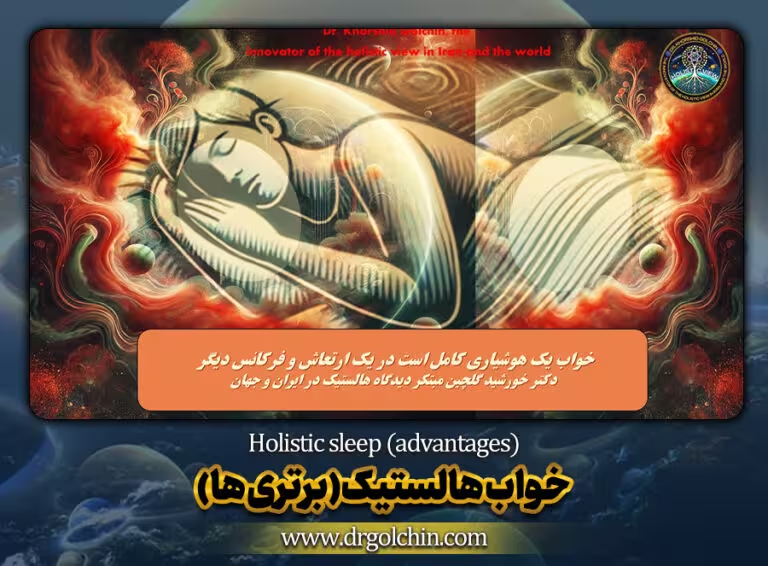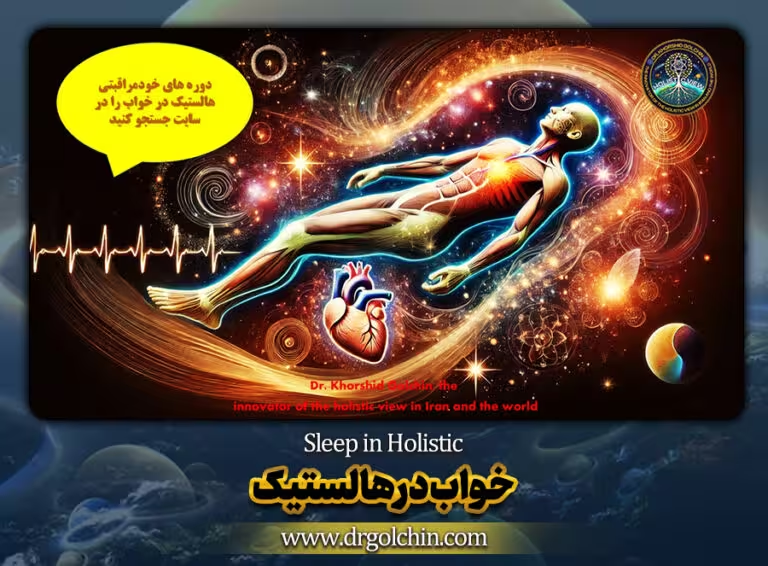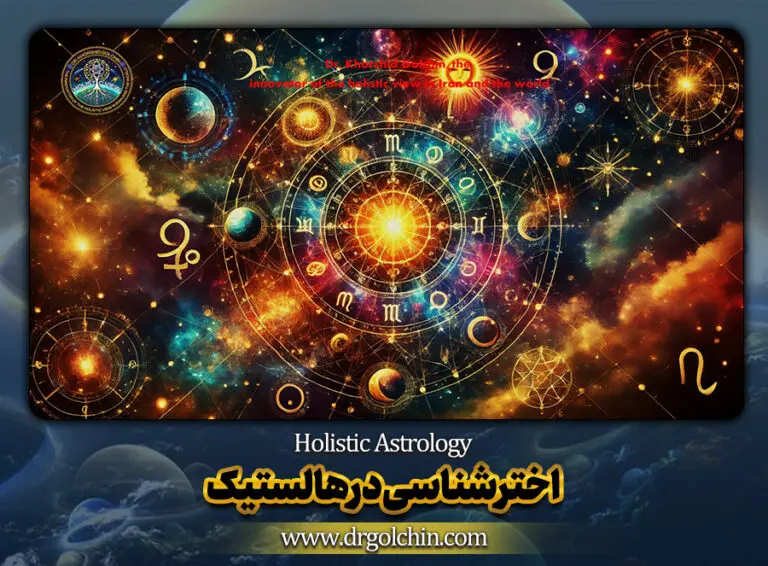سهم یکسان انسان ها از نعمت های جهان
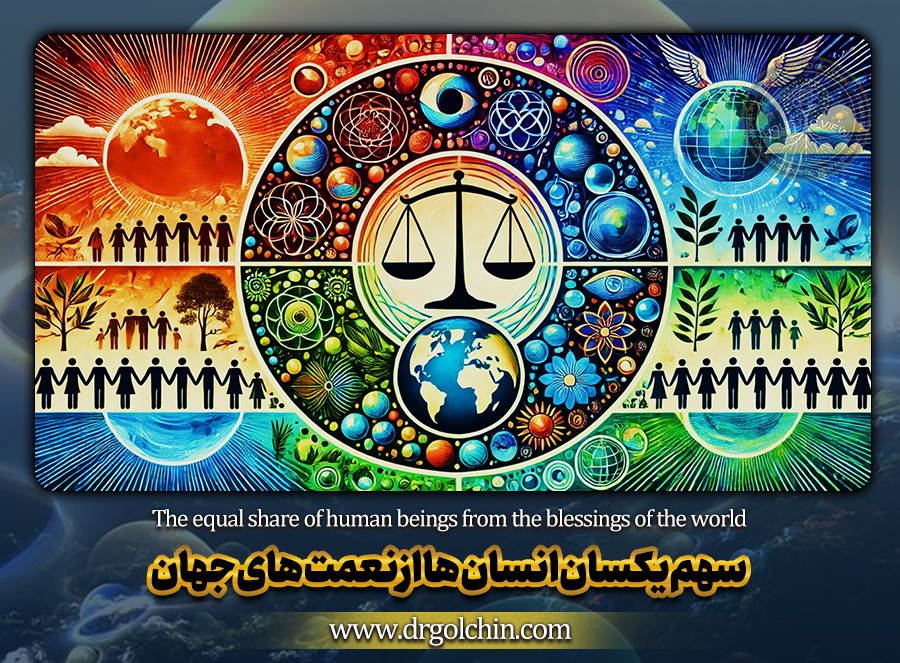
دکتر خورشید گلچین مبتکر دیدگاه هالستیک در ایران و جهان هستم ، معتقدم که همه ی انسان ها به یک اندازه از نعمت های جهان سهم دارند . دیدگاه هالستیک یا کلنگرانه یکی از مهمترین رویکردهای فلسفی و علمی است که به بررسی و تحلیل سیستمها، پدیدهها و انسانها به صورت یک کل واحد میپردازد، نه به عنوان اجزای جداگانه. دکتر خورشید گلچین، به عنوان مبتکر این دیدگاه در ایران و جهان، معتقد است که همه انسانها به یک اندازه از نعمتهای جهان سهم دارند. این باور میتواند زمینههای فلسفی، اخلاقی، اجتماعی و حتی علمی متعددی داشته باشد. در ادامه به تحلیل این دیدگاه ( سهم یکسان انسان ها از نعمت های جهان ) در چارچوب فلسفی، اجتماعی، و علمی پرداخته میشود.
فهرست عناوین
دیدگاه فلسفی
در فلسفه هالستیک، انسان به عنوان موجودی متشکل از جسم، ذهن و روح تلقی میشود که نمیتوان آنها را جداگانه بررسی کرد. بهعلاوه، این دیدگاه معتقد است که همه موجودات جهان، از جمله انسانها، به هم متصل و مرتبط هستند. بر اساس این فلسفه، تقسیم ناعادلانه نعمتها و منابع جهان نه تنها از نظر اخلاقی نادرست است، بلکه باعث تضعیف تعادل و هماهنگی بین انسانها و محیط زیست نیز میشود.
دکتر خورشید گلچین با این رویکرد، بر این باور است که هر انسانی، فارغ از موقعیت جغرافیایی، نژاد، جنسیت و طبقه اجتماعی، حق دسترسی برابر به منابع و فرصتها را دارد. این باور به نوعی بیانگر اصل عدالت جهانی است که بر مبنای احترام به کرامت انسانی و برابری حقوق افراد استوار است. به عبارت دیگر، دکتر گلچین معتقد است که اگر انسانها به یک اندازه از نعمتهای جهان بهرهمند نباشند، نابرابریها در نهایت به زیان همه افراد جامعه منجر خواهد شد. (سهم یکسان انسان ها از نعمت های جهان)
دیدگاه اجتماعی
از منظر اجتماعی، این باور که همه انسانها باید به یک اندازه از نعمتهای جهان بهرهمند شوند، چالشی جدی برای ساختارهای کنونی جهان به شمار میرود. در جوامع کنونی، نابرابریهای اجتماعی و اقتصادی به وضوح مشاهده میشود. برخی افراد دسترسی بیشتری به منابع طبیعی، اقتصادی و آموزشی دارند، در حالی که بسیاری دیگر از این فرصتها محروم هستند.
از دیدگاه دکتر گلچین، این نابرابریها نتیجه نگرشهای فردگرایانه و مصرفگرایانه است که در طول تاریخ تشدید شدهاند. این دیدگاههای ناعادلانه به تمرکز ثروت و قدرت در دست عدهای محدود منجر شده و بسیاری از افراد و جوامع را در فقر و بیعدالتی نگه داشته است.
با این حال، فلسفه هالستیک بر این نکته تأکید میکند که جامعهای که در آن برخی از افراد به ثروت و قدرت دسترسی دارند و دیگران از این نعمتها محرومند، نمیتواند به تعادل و پایداری دست یابد. به عبارت دیگر، نابرابریهای موجود باعث تضعیف پایههای اخلاقی و اجتماعی جوامع میشود و باعث افزایش تنشها، بیعدالتیها و حتی خشونتهای اجتماعی خواهد شد.
دیدگاه علمی در سهم یکسان انسان ها از نعمت های جهان
از منظر علمی، دیدگاه هالستیک بر این باور است که همه بخشهای یک سیستم به هم مرتبط هستند و تغییر در یک بخش میتواند تأثیرات گستردهای بر دیگر بخشها داشته باشد. این ایده در زمینههای مختلف علمی از جمله اکولوژی، فیزیک کوانتوم، و زیستشناسی تأیید شده است. به عنوان مثال، در حوزه اکولوژی، پژوهشها نشان دادهاند که تنوع زیستی و سلامت اکوسیستمها وابسته به تعادل و تعامل همه گونهها و منابع است. اگر یک گونه یا یک منبع از بین برود، کل اکوسیستم تحت تأثیر قرار میگیرد.
در حوزه انسانی، میتوان این مفهوم را به توزیع منابع و فرصتها تعمیم داد. بر اساس این دیدگاه، نابرابری در دسترسی به منابع و فرصتها میتواند منجر به ناپایداریهای اجتماعی، اقتصادی و حتی زیستمحیطی شود. به عنوان مثال، توزیع ناعادلانه منابع آب، غذا، و انرژی میتواند به افزایش بحرانهای زیستمحیطی و انسانی منجر شود، که در نهایت به ضرر همه افراد جامعه خواهد بود.

راهکارهای عملی برای تحقق دیدگاه هالستیک
برای عملیاتی کردن این باور که همه انسانها باید به یک اندازه از نعمتهای جهان بهرهمند شوند، دکتر گلچین پیشنهادات و راهکارهای متعددی ارائه میدهد. برخی از این راهکارها عبارتند از:
- آموزش و آگاهیبخشی: یکی از کلیدیترین راهکارها برای تحقق عدالت در توزیع منابع، افزایش آگاهی و آموزش افراد جامعه است. این آموزشها باید به گونهای طراحی شوند که افراد را با مفاهیم عدالت اجتماعی، احترام به کرامت انسانی و اهمیت توزیع برابر منابع آشنا سازد.
- اصلاح ساختارهای اقتصادی: برای کاهش نابرابریها، باید ساختارهای اقتصادی اصلاح شوند. این اصلاحات میتواند شامل افزایش مالیات بر ثروت، توزیع بهتر منابع و ایجاد فرصتهای برابر برای همه افراد جامعه باشد.
- ترویج مصرف پایدار: مصرفگرایی بیش از حد یکی از عوامل اصلی نابرابریهای جهانی است. دکتر گلچین بر اهمیت ترویج الگوهای مصرف پایدار و کاهش هدررفت منابع تأکید دارد. مصرف پایدار نه تنها به کاهش نابرابریها کمک میکند، بلکه به حفظ محیط زیست و منابع طبیعی نیز کمک خواهد کرد.
- تقویت همبستگی اجتماعی: یکی از اصول کلیدی دیدگاه هالستیک تقویت همبستگی و همکاری بین افراد و جوامع است. بر این اساس، جوامع باید به سمت همکاری بیشتر حرکت کنند و از رقابتهای ناعادلانه که منجر به نابرابری میشود، دوری کنند.
نتیجهگیری مقاله سهم یکسان انسان ها از نعمت های جهان
دیدگاه هالستیک دکتر خورشید گلچین که بر برابری در دسترسی به نعمتهای جهان تأکید دارد، نه تنها از نظر فلسفی و اخلاقی، بلکه از نظر اجتماعی و علمی نیز دارای اهمیت فراوانی است. این دیدگاه به عنوان پاسخی به نابرابریهای موجود در جهان، راهکاری برای دستیابی به تعادل، عدالت و پایداری اجتماعی و زیستمحیطی ارائه میدهد. با اتخاذ این رویکرد، میتوان به سمت جهانی حرکت کرد که در آن همه انسانها به یک اندازه از منابع و فرصتها بهرهمند باشند و به توسعهای پایدار و عادلانه دست یابند.
Dr. Khurshid Golchin is the originator of the holistic view in Iran and the world. I believe that all human beings have an equal share of the blessings of the world.
The holistic viewpoint, one of the most significant philosophical and scientific approaches, emphasizes examining and analyzing systems, phenomena, and human beings as a whole rather than as separate parts. Dr. Khorshid Golchin, as the pioneer of this perspective in Iran and globally, believes that all humans are equally entitled to the world’s blessings. This belief can have various philosophical, ethical, social, and even scientific foundations. Below, I will analyze this viewpoint from philosophical, social, and scientific perspectives.
- Philosophical Perspective
In holistic philosophy, humans are viewed as beings composed of body, mind, and spirit, which cannot be analyzed in isolation. Additionally, this viewpoint believes that all beings in the world, including humans, are interconnected. Based on this philosophy, the unjust distribution of blessings and resources is not only morally wrong but also disrupts the balance and harmony between humans and the environment.
Dr. Golchin’s perspective emphasizes that every individual, regardless of geographical location, race, gender, or social class, has the right to equal access to resources and opportunities. This belief reflects the principle of global justice, founded on respect for human dignity and equality of rights. In other words, Dr. Golchin believes that if all humans do not have equal access to the world’s blessings, inequalities will ultimately harm all members of society.
- Social Perspective
From a social standpoint, the belief that all humans should equally share in the world’s blessings presents a significant challenge to the current structures of society. In modern societies, social and economic inequalities are clearly evident. Some individuals have greater access to natural, economic, and educational resources, while many others are deprived of these opportunities.
From Dr. Golchin’s viewpoint, these inequalities are the result of individualistic and consumerist attitudes that have been exacerbated throughout history. These unjust perspectives have led to the concentration of wealth and power in the hands of a few, keeping many individuals and communities in poverty and injustice.
However, the holistic philosophy emphasizes that a society where some individuals have access to wealth and power while others are deprived cannot achieve balance and sustainability. In other words, existing inequalities weaken the moral and social foundations of societies and lead to increased tensions, injustices, and even social violence.
- Scientific Perspective
From a scientific perspective, the holistic viewpoint asserts that all parts of a system are interconnected, and changes in one part can have widespread effects on others. This idea has been confirmed in various scientific fields, including ecology, quantum physics, and biology. For instance, in ecology, research has shown that biodiversity and the health of ecosystems depend on the balance and interaction of all species and resources. If one species or resource is lost, the entire ecosystem is affected.
In the human context, this concept can be extended to the distribution of resources and opportunities. According to this view, inequality in access to resources and opportunities can lead to social, economic, and even environmental instability. For example, the unequal distribution of water, food, and energy resources can lead to increased environmental and human crises, ultimately harming all members of society.
- Practical Solutions for Implementing the Holistic View
To implement this belief that all humans should equally share in the world’s blessings, Dr. Golchin offers several suggestions and practical solutions. Some of these solutions include:
- Education and Awareness: One of the key solutions to achieving justice in resource distribution is increasing awareness and education within society. This education should be designed to familiarize individuals with concepts of social justice, respect for human dignity, and the importance of equal distribution of resources.
- Reforming Economic Structures: To reduce inequalities, economic structures need to be reformed. These reforms may include increasing wealth taxes, better distribution of resources, and creating equal opportunities for all members of society.
- Promoting Sustainable Consumption: Excessive consumerism is one of the main factors behind global inequalities. Dr. Golchin emphasizes the importance of promoting sustainable consumption patterns and reducing resource wastage. Sustainable consumption not only helps reduce inequalities but also contributes to the preservation of the environment and natural resources.
- Strengthening Social Solidarity: One of the key principles of the holistic view is to strengthen solidarity and cooperation among individuals and communities. Based on this, societies should move towards greater cooperation and avoid unfair competitions that lead to inequality.( The equal share of human beings from the blessings of the world )
Conclusion
Dr. Khorshid Golchin’s holistic view, which emphasizes equality in access to the world’s blessings, is not only of great philosophical and ethical importance but also holds significant social and scientific relevance. This viewpoint, as a response to the existing inequalities in the world, offers a solution for achieving balance, justice, and social and environmental sustainability. By adopting this approach, we can move towards a world where all humans share equally in resources and opportunities, and achieve a sustainable and just development.


